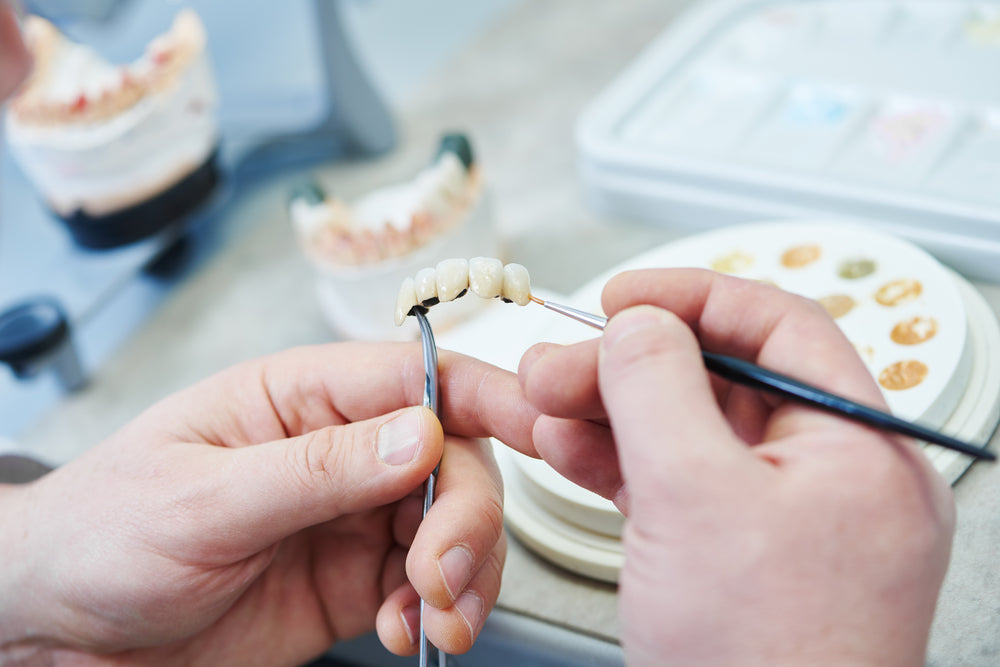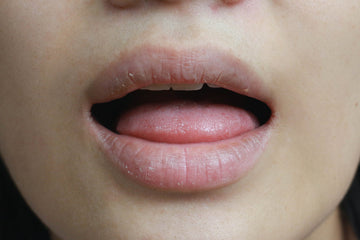What is a Prosthodontist & the Uses, Types of Prosthodontics

When it comes to restoring damaged or missing teeth, prosthodontics plays a vital role in modern dentistry.
From crowns and bridges to full dentures and complex reconstructions, these specialised treatments help patients regain both function and confidence in their smiles.
In this guide, Dr Sanjay Patel explains what a prosthodontist is, the various types of prosthodontic treatments available, and how they can benefit your oral health and overall wellbeing.
What is prosthodontics?
Prosthodontics is a specialised branch of dentistry.
It focuses on the design, creation and fitting of artificial replacements for the teeth and other parts of the mouth for those with substantial damage, discomfort or ongoing issues.
It can involve the use of restorations like crowns, dentures, and implants to restore function to a patient’s smile or simply change its appearance to regain confidence.
What is a prosthodontist?
A prosthodontist is a dentist who has undergone additional, extensive training to be able to offer prosthodontic treatments.
They’re typically experts in restoring teeth and creating bespoke crowns, bridges and dentures to help patients get their dream smile and a healthier mouth.
Most prosthodontists are typically trained to:
· Restore broken, worn, or decayed teeth using crowns or veneers.
· Replace missing teeth with dentures, bridges, or implants.
· Perform full-mouth reconstructions for complex dental problems.
· Design aesthetic (cosmetic) treatments to improve one’s smile.
· Fabricate special prostheses for patients with facial or jaw defects (maxillofacial prosthetics).
Types of prosthodontists
Although most prosthodontists are trained to perform a wide range of procedures, it’s not uncommon for prosthodontists to train in a more niche specialism within prosthodontics.
The main types of prosthodontists are:
Fixed prosthodontists
These focus on permanent, non-removable dental restorations – specialising in crowns, bridges, veneers, inlays and onlays.
Patients might visit a prosthodontist if they have severely damaged or missing teeth that need permanent fixtures to restore function.
Removable prosthodontists
While some specialise in designing permanent fittings, others focus on removable options – think dentures and partial dentures.
Patients who don’t qualify for implants or fixed restorations may be referred to a removable specialist in prosthodontics.
Implant prosthodontists
Similarly to fixed prosthodontists, implant-focused prosthodontists - also known as Implantologist - specialise in implant fittings. They train to fix permanent solutions to the jaw. This might include things like fitting implant-supported crowns, bridges and dentures.
Patients seeking long-term fixed solutions for missing teeth might be offered implants from a qualified prosthodontist to fix and transform their smiles.
Maxillofacial prosthodontists
These prosthodontists specialise in providing rehabilitation for patients with head, neck or jaw defects, whether it be from disease, trauma, injury or genetic causes.
Cancer survivors, trauma patients or those with congenital defects may be referred to a maxillofacial prosthodontist to be treated.
Maxillofacial prosthodontists can offer things like obturators, facial prosthetics (for the ears, nose and even eyes) and speech appliances to help with speech after oral or neck surgeries.
Cosmetic prosthodontists
For people with no existing conditions or damage, looking to improve their appearance and gain more confidence, cosmetic prosthodontists specialise in complete smile makeovers.
You might visit a cosmetic prosthodontist for veneers or full-mouth reconstructions, which can help limit whitening discoloured teeth, straighten misaligned teeth and repair worn teeth to improve appearance.
Who needs prosthodontics?
People with significant oral problems, like teeth rotting away from decay, injury and damage and other dental health issues, are typically referred to a prosthodontist to help by installing long-term prosthetics to improve their smiles.
As well, you might go to a prosthodontist if you need full mouth rehabilitation, meaning you need multiple procedures to fix your mouth.
It’s not reserved only for people with extensive damage, though. You can visit a prosthodontist at any time for restorations to your mouth, even if you’re simply just lacking confidence in your smile.
FAQs
1. What is the difference between a dentist and a prosthodontist?
Think about it like this. All prosthodontists were once dentists, but not all dentists are prosthodontists.
While you might visit your dentist for a routine check-up, fillings, cleanings or basic restorations, a prosthodontist is more specialised.
They’re dentists that have undergone additional training to perform more complex procedures, like fitting permanent crowns and implants and even performing full-mouth rehabilitation.
2. What is the difference between orthodontics and prosthodontics?
Orthodontics focuses on the alignment of the teeth and jaw only. Orthodontists specialise in fixing misaligned teeth with braces and clear aligners while also helping to solve issues like tooth crowding and biting problems.
Prosthodontics, in contrast, is concerned with restoring or replacing missing or damaged teeth using prosthetic solutions.
3. Are there any risks with prosthodontic treatments?
As with any dental or medical procedure, prosthodontic treatments do carry some risks, although the risk is usually minimal when performed by a qualified professional.
Although safe, you can experience:
· Infection, particularly after implant placement.
· Allergic reactions to materials.
· Discomfort or adjustment period with new prostheses.
· Wear or damage to surrounding teeth or soft tissues may occur if not properly fitted.
If you’re considering treatment, there’s no need for concern. Your prosthodontist will discuss potential complications and how to avoid them as part of your treatment plan!





